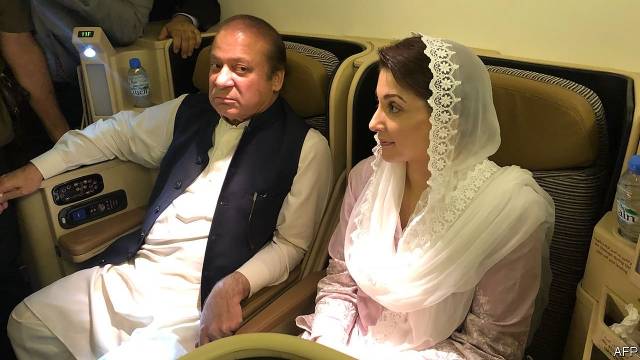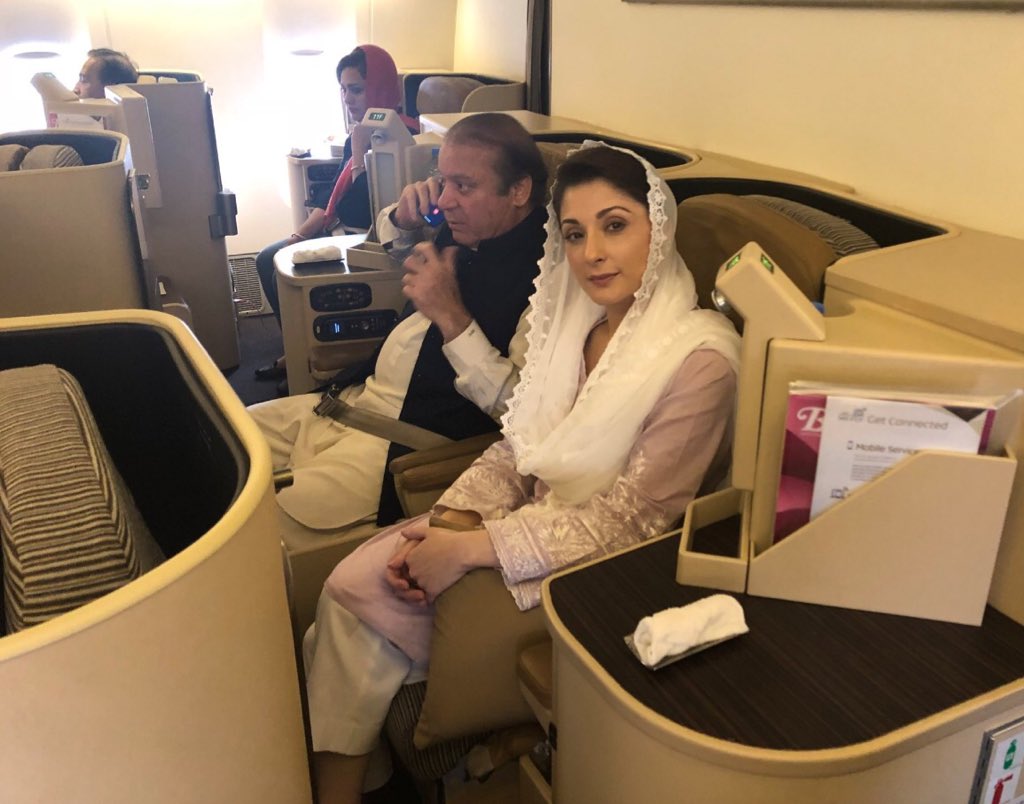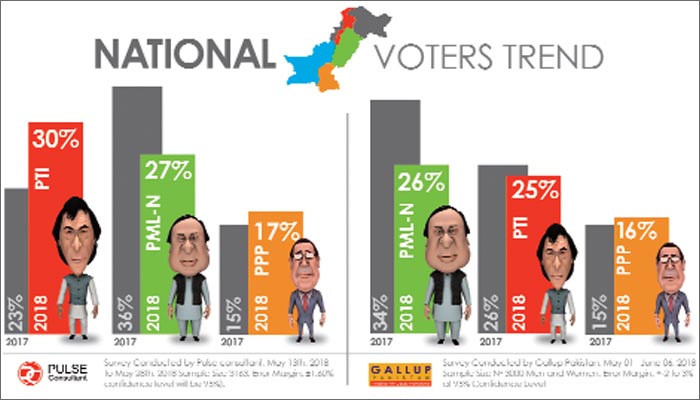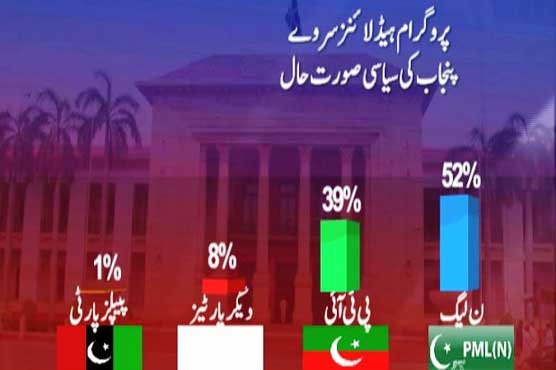
The July 6 verdict against Nawaz Sharif, Maryam Nawaz and Capt (r) Muhammad Safdar in the Avenfield case, had brought the upcoming general elections to the brink of superfluity.
A coalition government might still be inevitable despite the developments over the past 10 days, with the trio having handed themselves over for imprisonment, but a hung parliament with Nawaz Sharif in exile and one with him slugging it out in the country are two completely different beasts.
Post-verdict decision
Everyone, most of all the Sharifs themselves, would’ve known what the accountability court’s verdict in the Avenfield case was going to be for most of the 10-month duration that it lingered. Any loitering doubts would’ve been erased following the Supreme Court’s ruling in April that disqualification under the Constitution’s Article 62 (1)(f) is for life.
And so, the Sharifs would’ve had ample time to decide which of the two obvious options they would go for: self-exile and live off their riches or salvage their political futures, including perhaps of the party that’s still named after Nawaz Sharif, by going to jail.
The decision to return from London, be arrested and spend some time in jail before appealing the Avenfield verdict in the Islamabad High Court shows that Nawaz and Maryam are sincere to their own narrative that the judicio-military complex is undermining parliamentary supremacy and sidelining Nawaz Sharif because the former premier challenged the establishment’s hegemony, especially over the security policy.

However, Nawaz has always been driven by interests more than any moral position. And it’s when principles and self-interests overlap that he feels the strongest.
Even so, maybe the real driving force for the three-time ousted prime minister of Pakistan is a lot more personal.
Family front
Perhaps more dauntingly for Nawaz, the Avenfield verdict threatened to bring the curtain down on his daughter Maryam’s career more so than his.
If all had gone according to plan – no Dawn Leaks, no Panama Papers, no Avenfield reference – Nawaz Sharif would’ve completed his third term in the PM office and would’ve been looking towards a 1997-esque triumph in the July 25 elections.
This would’ve been followed by a gradual transition of power – and indeed party control – towards Maryam Nawaz, who has not only been influential in a lot of her father’s spearheaded policymaking since 2013, but has also echoed – if not scribbled – Nawaz’s post-disqualification gung-ho narrative towards the military establishment, punctuated by his Mumbai attacks claim in May.
But while the party may still be named after him, Nawaz knows that the Pakistan Muslim League-Nawaz (PML-N) is now led and run by brother Shehbaz Sharif and his son Hamza Shehbaz.

And so, with Nawaz loyalists like Zaeem Qadri being alienated, the then NA-120 by-election not witnessing any involvement of the Shehbaz family, the Shehbaz-led caravan never reaching the airport to receive them on Friday, Nawaz and Maryam’s return to Pakistan is as much a quest to ensure their party’s control over the next government as it is about ascertaining their own control over the PML-N.
Victim narrative
Just like the question over forming the government, which brother’s family gets to control the PML-N will be decided following the election results and the performance of the respective camps.
But both sections realise that their respective chances work in tandem and are bolstered by depiction of absolute unity within the party and the Sharif family.
Despite the multi-pronged crises that Nawaz Sharif has undergone over the past year or so, the pre-poll surveys have the PML-N as the party likely to bag the most seats following the elections. The question, however, is whether the lead – if there indeed is to be one – would suffice in the party leading the eventual coalition government.

What’s safe to say is that the return of Nawaz and Maryam and their arrest has done absolutely no harm to the party’s chances. Should they get the bail that they expect, they can take to the road and spend the last few days in the lead-up to the elections going all out to drive home their victimhood.
Both Nawaz and Maryam are certain that this victim narrative and all-out attack on the military establishment is resonating with the masses in Punjab, and would deliver them the seats they need to spearhead the government.
The enemy
With the Pakistan People’s Party having been wiped out of the province, Punjab will be a two-horse race between the PML-N and Pakistan Tehreek-e-Insaf, with independent candidates up for grabs for whoever manages to get a decisive lead.
With PML-N’s South Punjab defectors joining the PTI, the latter has grown strongly in the region, while central and northern parts of the province remain the strength of Nawaz Sharif’s party, even if not as resoundingly as they were in the past.
But this is where Nawaz would love the elections in Punjab to become a battle of narratives, for while he has remained true to his, Imran Khan has completely given up on what was once his party’s raison d’etre – an ‘alternative’ to the corrupt powerbrokers, which the PTI has now stuffed itself with, in the garb of putting together a band of ‘electables’.

This, however, plays right into Nawaz Sharif’s claims that Imran Khan is the military’s stooge, with the army leadership putting everything they’ve got behind him to ensure that their man finally lands in the PM House and his party spearheads the next government.
The battle
While Imran Khan and PTI might be the face, the PML-N’s actual battle is against the military establishment. The challenge Nawaz Sharif faces can be gauged by the tactics deployed by the establishment to sideline the PML-N.
The day Nawaz and Maryam were to land in Lahore, hundreds of the PML-N’s workers were detained, prompting even the PPP chairman Bilawal Bhutto Zardari to question the rationale. Furthermore, there has been significant censorship of the pro-Nawaz sentiments on the streets, with the military having stranglehold over the media.
Claims of the military coercing candidates into distancing themselves from the PML-N have also regularly surfaced, with many army officials virtually campaigning for the PTI.
Furthermore, with army backed Islamist groups also thrown into the picture – with the likes of Tehrik-e-Labbaik Ya Rasool Allah (TLY), the Muttahida Majlis-e-Amal (MMA) and the independent candidates affiliated with the Milli Muslim League (MML) – there is a wide gamut of players thrown into the mix, to get the desired fractured parliament following the elections.
The war
The battlefield, for Nawaz, is prepared for the all-or-nothing showdown next week. While his fight is against the military establishment trying to make him politically redundant, the battles ahead will determine the status of parliamentary supremacy in Pakistan.
With a history marred by military rule – either front or back – a victory for the PML-N, even if it merely suffices in leading a hung parliament, would give credence to Nawaz’s optimism and allow the civilian government to gradually bite into the space that the military establishment hasn’t ceded for the past seven decades.
This would mean a glimmer of hope vis-à-vis a potential revision of the masochistic and duplicitous security policy that is exemplified by Pakistan being grey-listed by the Financial Action Task Force last month, and epitomised by Friday’s Mastung massacre – the second deadliest terror attack in the history of the country.
While Nawaz’s quest right now might be dedicated to reclaiming his and Maryam’s political relevance, in the larger spectrum it is translating into a war for parliamentary authority, where accountability for corruption – moral or financial – is spread across the board.
And even though a hung parliament doesn’t bring us much closer to the inevitable civilian supremacy, a coalition government led by the military’s players will take the country further away from it.
A coalition government might still be inevitable despite the developments over the past 10 days, with the trio having handed themselves over for imprisonment, but a hung parliament with Nawaz Sharif in exile and one with him slugging it out in the country are two completely different beasts.
Post-verdict decision
Everyone, most of all the Sharifs themselves, would’ve known what the accountability court’s verdict in the Avenfield case was going to be for most of the 10-month duration that it lingered. Any loitering doubts would’ve been erased following the Supreme Court’s ruling in April that disqualification under the Constitution’s Article 62 (1)(f) is for life.
Nawaz Arrest at Lahore , Security people don’t like it pic.twitter.com/Qn46DeuOzY
— Abdul Qayyum Siddiqui (@QayyumReports) July 13, 2018
And so, the Sharifs would’ve had ample time to decide which of the two obvious options they would go for: self-exile and live off their riches or salvage their political futures, including perhaps of the party that’s still named after Nawaz Sharif, by going to jail.
The decision to return from London, be arrested and spend some time in jail before appealing the Avenfield verdict in the Islamabad High Court shows that Nawaz and Maryam are sincere to their own narrative that the judicio-military complex is undermining parliamentary supremacy and sidelining Nawaz Sharif because the former premier challenged the establishment’s hegemony, especially over the security policy.

However, Nawaz has always been driven by interests more than any moral position. And it’s when principles and self-interests overlap that he feels the strongest.
Even so, maybe the real driving force for the three-time ousted prime minister of Pakistan is a lot more personal.
Family front
Perhaps more dauntingly for Nawaz, the Avenfield verdict threatened to bring the curtain down on his daughter Maryam’s career more so than his.
If all had gone according to plan – no Dawn Leaks, no Panama Papers, no Avenfield reference – Nawaz Sharif would’ve completed his third term in the PM office and would’ve been looking towards a 1997-esque triumph in the July 25 elections.
This would’ve been followed by a gradual transition of power – and indeed party control – towards Maryam Nawaz, who has not only been influential in a lot of her father’s spearheaded policymaking since 2013, but has also echoed – if not scribbled – Nawaz’s post-disqualification gung-ho narrative towards the military establishment, punctuated by his Mumbai attacks claim in May.
But while the party may still be named after him, Nawaz knows that the Pakistan Muslim League-Nawaz (PML-N) is now led and run by brother Shehbaz Sharif and his son Hamza Shehbaz.

And so, with Nawaz loyalists like Zaeem Qadri being alienated, the then NA-120 by-election not witnessing any involvement of the Shehbaz family, the Shehbaz-led caravan never reaching the airport to receive them on Friday, Nawaz and Maryam’s return to Pakistan is as much a quest to ensure their party’s control over the next government as it is about ascertaining their own control over the PML-N.
Victim narrative
Just like the question over forming the government, which brother’s family gets to control the PML-N will be decided following the election results and the performance of the respective camps.
But both sections realise that their respective chances work in tandem and are bolstered by depiction of absolute unity within the party and the Sharif family.
Despite the multi-pronged crises that Nawaz Sharif has undergone over the past year or so, the pre-poll surveys have the PML-N as the party likely to bag the most seats following the elections. The question, however, is whether the lead – if there indeed is to be one – would suffice in the party leading the eventual coalition government.

Courtesy: The News
What’s safe to say is that the return of Nawaz and Maryam and their arrest has done absolutely no harm to the party’s chances. Should they get the bail that they expect, they can take to the road and spend the last few days in the lead-up to the elections going all out to drive home their victimhood.
Both Nawaz and Maryam are certain that this victim narrative and all-out attack on the military establishment is resonating with the masses in Punjab, and would deliver them the seats they need to spearhead the government.
The enemy
With the Pakistan People’s Party having been wiped out of the province, Punjab will be a two-horse race between the PML-N and Pakistan Tehreek-e-Insaf, with independent candidates up for grabs for whoever manages to get a decisive lead.
With PML-N’s South Punjab defectors joining the PTI, the latter has grown strongly in the region, while central and northern parts of the province remain the strength of Nawaz Sharif’s party, even if not as resoundingly as they were in the past.
But this is where Nawaz would love the elections in Punjab to become a battle of narratives, for while he has remained true to his, Imran Khan has completely given up on what was once his party’s raison d’etre – an ‘alternative’ to the corrupt powerbrokers, which the PTI has now stuffed itself with, in the garb of putting together a band of ‘electables’.

Courtesy Dunya News
This, however, plays right into Nawaz Sharif’s claims that Imran Khan is the military’s stooge, with the army leadership putting everything they’ve got behind him to ensure that their man finally lands in the PM House and his party spearheads the next government.
The battle
While Imran Khan and PTI might be the face, the PML-N’s actual battle is against the military establishment. The challenge Nawaz Sharif faces can be gauged by the tactics deployed by the establishment to sideline the PML-N.
The day Nawaz and Maryam were to land in Lahore, hundreds of the PML-N’s workers were detained, prompting even the PPP chairman Bilawal Bhutto Zardari to question the rationale. Furthermore, there has been significant censorship of the pro-Nawaz sentiments on the streets, with the military having stranglehold over the media.
Understand the legal grounds for arrest of MNS after NAB conviction but on what grounds are workers and leaders being arrested? Why is Lahore under siege ? Right to peacful protest is fundamental for democracy.
— BilawalBhuttoZardari (@BBhuttoZardari) July 13, 2018
Claims of the military coercing candidates into distancing themselves from the PML-N have also regularly surfaced, with many army officials virtually campaigning for the PTI.
Furthermore, with army backed Islamist groups also thrown into the picture – with the likes of Tehrik-e-Labbaik Ya Rasool Allah (TLY), the Muttahida Majlis-e-Amal (MMA) and the independent candidates affiliated with the Milli Muslim League (MML) – there is a wide gamut of players thrown into the mix, to get the desired fractured parliament following the elections.
The war
The battlefield, for Nawaz, is prepared for the all-or-nothing showdown next week. While his fight is against the military establishment trying to make him politically redundant, the battles ahead will determine the status of parliamentary supremacy in Pakistan.
With a history marred by military rule – either front or back – a victory for the PML-N, even if it merely suffices in leading a hung parliament, would give credence to Nawaz’s optimism and allow the civilian government to gradually bite into the space that the military establishment hasn’t ceded for the past seven decades.
.@MaryamNSharif says her father is not in a contest with PTI. But party defections have made it an uphill task for the @pmln_org. pic.twitter.com/RYAIPEr75F
— NayaDaur (@nayadaurpk) July 5, 2018
This would mean a glimmer of hope vis-à-vis a potential revision of the masochistic and duplicitous security policy that is exemplified by Pakistan being grey-listed by the Financial Action Task Force last month, and epitomised by Friday’s Mastung massacre – the second deadliest terror attack in the history of the country.
While Nawaz’s quest right now might be dedicated to reclaiming his and Maryam’s political relevance, in the larger spectrum it is translating into a war for parliamentary authority, where accountability for corruption – moral or financial – is spread across the board.
And even though a hung parliament doesn’t bring us much closer to the inevitable civilian supremacy, a coalition government led by the military’s players will take the country further away from it.
